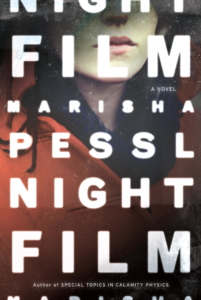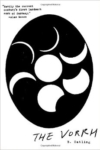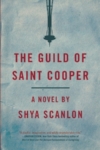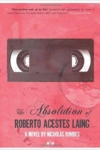“Everyone has a Cordova story, whether they like it or not,” begins Night Film, Marisha Pessl’s second novel. Night Film is part detective fiction, part horror story, part film buff’s fictional wet dream. Ashley Cordova, the daughter of reclusive cult film director Stanislas Cordova, has been found dead, and her death ruled a suicide. Scott McGrath, an investigative reporter “who’d go to hell just to get Lucifer on the record” but has recently fallen out of favor due to some ill-chosen remarks made on live television, is skeptical, perhaps because McGrath blames his fall from grace on Ashley’s father. McGrath sets out to investigate her death, and becomes embroiled in a terrifying narrative of the Cordova family history, abuse, sexual deviance, and demon worshipping.
If that list sounds faintly ridiculous, that’s because it is — but it’s also absolutely thrilling. Night Film is a little bit like Polanski’s The Ninth Gate — if that movie had been as smart as The Club Dumas on which it was based, if it had been about cult horror films and their reclusive director instead of medieval texts, if Corso’s sidekick had been a homeless aspiring actress and a lovesick drug dealer instead of a demonic chain-smoking blonde. Stanislas Cordova is a director of terrifying, soul-shattering films that can only be described as “horrific ordeals,” and can cause a fear of the dark so strong that the viewer may never sleep with the lights off again. Cordova is “a crevice, a black hole, an unspecified danger, a relentless outbreak of the unknown in our overexposed world. . . . He’s a myth, a monster, a mortal man.” One of the most delightful parts of this novel comes in the short descriptions we get of his films — most of which are banned—from Thumbscrew, which beat Kramer vs. Kramer for the Oscar in 1979, to 1985’s Lovechild, a violent thriller, to his final movie, To Breathe With Kings, a murder mystery whose starring role was played by Cordova’s daughter Ashley. Actors are interviewed extensively for these roles, then brought to Cordova’s vast estate in New York to film in isolation. Pessl’s novel is peppered with mixed media inserts — there are (fake) replications of a Vanity Fair article, a Rolling Stone article, police reports and secret fan forums (not to mention a mockup of a Time slideshow). Night Film is tightly plotted for a novel that clocks in at almost 600 pages: the novel’s tension builds steadily toward its harrowing climax, and each scene, each confusing side path McGrath’s investigation takes, only serves to convince us of the evil at the novel’s heart. “I think I’m inside a Cordova film,” McGrath says to a friend of his, and by this point, we’re not sure if that’s as crazy as it sounds.
For a novel whose main character’s vocation is ferreting out hidden truths, Night Film is surprisingly contemptuous of social media’s information glut. The argument runs something like this: there’s a superfluity of information in the 21st century, and the impression of connectivity that we get from the Internet really means that we are not connected at all. Convincing as this argument is, it’s neither new nor interesting, and coming as it does from McGrath, a man whose inability to connect with the people in his life has little to do with his access to technology and a lot to do with his own ego, it’s also not particularly compelling. Perhaps the only way to explain this is to tie it in with the figure of Cordova himself, as the reclusive director whose absence from social media marks him as a dangerous figure. Truly, the most persuasive argument against social media comes not from Scott McGrath’s first-person narration, but from the dialogue of another character — who, in fact, is revealed to be one of McGrath’s primary antagonists. “I know it’s hard to fathom today,” says this character near the end of the novel:
but a true artist needs darkness in order to create. It gives him his power. His invisibility. The less the world knows about him, his whereabouts, his origins and secret methods, the more strength he has. The more inanities about him the world eats, the smaller and drier his art until it shrinks and shrivels into a Lucky Charms marshmallow to be consumed in a little bowl with milk for breakfast.
While social alienation is an integral part of the novel’s central tragedy, it is entirely unrelated to technology’s false promise. Furthermore, this condemnation feels more than a bit disingenuous, especially considering that the novel is packed with so-called Easter eggs — a page at the end of the novel prompts you to download the “Night Film App,” which, if you have a smartphone with a camera, scans pages of the novel where a bird symbol appears and provides you with even more multimedia material. There are recorded doctor’s notes, a podcast, and film stills from Cordova’s movies, all supplementing the mixed media within the novel, like the screenshots of the secret fan forum where the director’s followers discuss theories. The movie posters, especially, made me want even more to see the nonexistent films, the threat of nyctophobia notwithstanding. (What can I say? The lure of the forbidden is powerful.)
It’s hard to know what to do with Night Film’s mixed messages regarding technology, which is a shame because of how delightful Pessl’s novel otherwise happens to be. Pessl has an ear for dialogue: her characters rarely share speech patterns, and even the appearance of a heavy accent flows into the dialogue, rather than grating through it. She also has a knack for cleverly placed italics to indicate either internal thoughts or shocked realization — often both, and to surprisingly humorous effect. Before Night Film, that was an effect I’d only ever seen Thomas Pynchon pull off.
There’s a twist at the end, a big reveal — but the novel doesn’t end there, and it’s just as well it doesn’t. In a way, this novel has three different endings that almost make it three different stories, but Pessl’s commitment to her narrative is total: she refuses to give us the easy ending, the rational explanation that might risk cheapening everything that has come before. Instead, Night Film ends in the future tense, promising that there will be an explanation — then slyly keeping it from our grasp.
This post may contain affiliate links.








